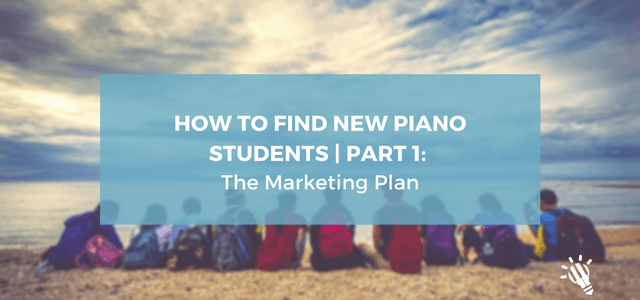
Are you a new teacher looking to build your piano studio? Or have you recently lost a few students who’ve graduated or moved on? Perhaps you’d like to expand your already-thriving studio and hire other teachers to help. Whatever your situation, if you’re on the lookout for new students to build your business, then this series is for you!
I’m excited to welcome Doug Hanvey as a guest writer at topmusic.co. Doug is an inspirational teacher, composer and author based in Portland, Oregon who runs a busy studio called Portland Piano Lab. In this 2-part series, Doug shows you that it’s easy to be proactive in promoting your studio (and avoid relying solely on word-of-mouth)….You just need to start with a quick plan.
While a new piano teacher might think they can open their studio and students will just show up, the reality is that a piano studio is like any small business – it needs to market itself to be noticed. You might have heard of studios that quickly built themselves up by word-of-mouth, and thought, “I’ll just do that. I don’t need to market myself”. But even word-of-mouth is marketing (and a very slow form of marketing, at that)!
Before you even consider specific strategies like word-of-mouth marketing, taking the time to write a marketing plan for your studio containing your marketing objectives and the specific strategies you will use to achieve those objectives, can be a great way to start.
Just like you give each student an organized practice plan for the week, you should have an organized plan to market your studio.
Think about how many students you want to teach – do you just need a couple of extras or are you looking to fill a whole week? What ages would you like to teach (this will impact where you advertise)? Have you got the time and resources to support these new students?
 But I don’t have time to write a plan!
But I don’t have time to write a plan!If you don’t know much about marketing, writing a marketing plan might sound intimidating, but it doesn’t have to be.
The most effective marketing plan is concise and to the point. I like to use the Seven Sentence Marketing Plan suggested by Jay Conrad Levinson in his classic book Guerrilla Marketing.
It’s structured like this:
Sentence One: the purpose of your strategy.
Sentence Two: how you’ll achieve your purpose.
Sentence Three: your target market.
Sentence Four: the marketing strategies you’ll use.
Sentence Five: your niche.
Sentence Six: your business identity.
Sentence Seven: your marketing budget.
Here’s how simple, but effective, a marketing plan can be:
With your marketing plan in place, you can start to consider the many possible strategies available for marketing a piano studio in the 21st century. We’ll talk about this more in Part 2.
So you’ve got your plan and thought about your goals. Now what?
In the second part of this series, I’ll be discussing some of the best ways to get your studio noticed, including online advertising, building your website, SEO (search engine optimisation), networking and social media and give you some extra resources in these areas for further reading.
Click here to read PART 2 in this series.
Have you ever considered creating a marketing plan for your studio? Do you feel it helped?
